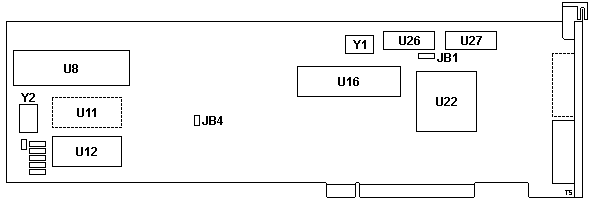|
@6674.ADF DayStar LocalTalk/MCA AppleTalk Adapter - DayStar Digital
DayStar LocalTalk LT200 & FS100 Installation Manual (scan by Alexandros Paterakis)
LocalTalk LT200 Adapter
Changing Interrupt Level
Changing Port Address
ADF Sections
LocalTalk LT200 Adapter P/N 2271018-001
![Front [P]](/other/img/photo.gif) (WIP outline, better photo needed)
(WIP outline, better photo needed)

U8 Zilog Z8018008PSC 80180 MPU @ 8 MHz, DIP-64 package
U16 Zilog (ST) Z8530AB1 Serial Communication Controller (SCC), NMOS, Universal-Bus
Dual channel, multiprotocol data communication peripheral (serial <-> parallel)
Huh, what are all the jumpers about?
Changing Interrupt Level
Power On Setup (POS) is a new feature introduced by IBM in an attempt to
relieve the end user of being expected to configure option cards to function in
their PC's. The PS/2 comes with a Setup\Reference diskette that contains
software to dynamically configure the Adapters at installation.
The DayStar LocalTalk Board contains fixed resources that are configured in
the following manner:
pos[0]=xxxx1001b 3 or Register 3
pos[1]=01000000b Not User Addressable
pos[2]=00000011b Not User Addressable
pos[3]=XXXX1010b Not User Addressable
If there is an address conflict with other cards, Interrupt 3 (pos[0]) can
be changed to eliminate the conflict.
To change the Interrupt, configure pos[0]=xxxx1001b, using EDLIN or any text
editor, to the new interrupt level as follows:
XXXX1011B = Interrupt level 5
XXXX1101B = Interrupt level 6
XXXX1111B = Interrupt level 7
Re-configure your PS/2 using the new ADF file on the PS/2 Reference
Diskette. The Autoexec.bat file must be configured to include the new interrupt
command as follows:
DTALK (space) /Cardinit=x (x=the new interrupt level)
Changing Port Address
>Register 4 == 01000000B. The least significant byte of the port address.
This is equivalent to 40H (hex). DayStar uses port address 340. This register
is used in conjunction with Register 5, which is the most significant byte.
Other address configurations, for example, are:
01010000B == 50H
01100000B == 60H
10100000B == AAH
Care should be taken that these addresses do not collide with other
installed, or system hardware addresses.
ADF Sections
Ed. Tom: This has to be the most incompetent ADF
I've ever seen. The adapter has POS registers, but they entirely killed that
aspect by making all resources fixed, not telling the System Configuration what
resources are actually being used, and making the user edit the ADF manually!
How is this better than jumpers? I hope somebody was punished for shipping the
card with this abomination. On the positive side, it should be easy to write a
proper ADF for the card.
fixedresources
pos[0]=xxxx1001b
pos[1]=01000000b
pos[2]=00000011b
pos[3]=XXXX1010b
|